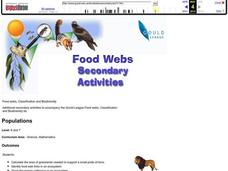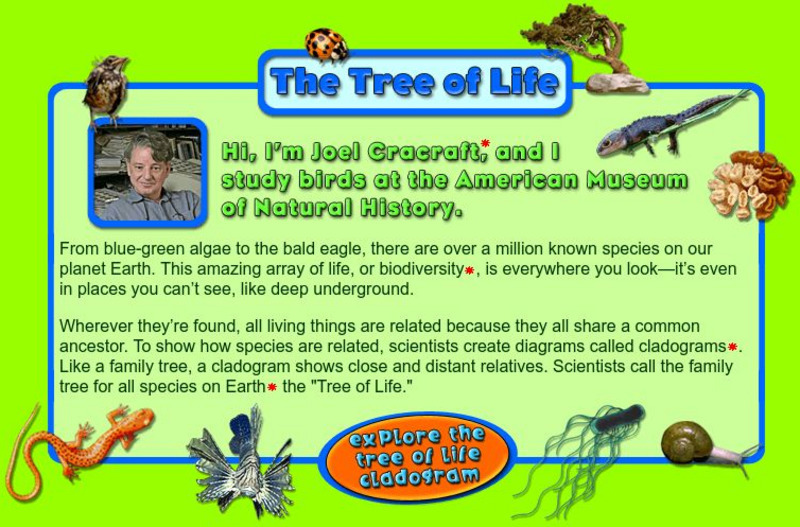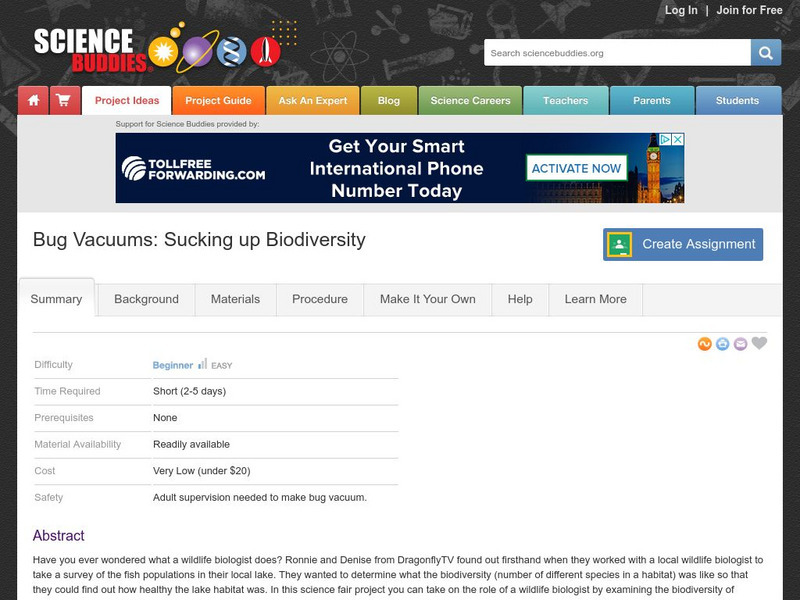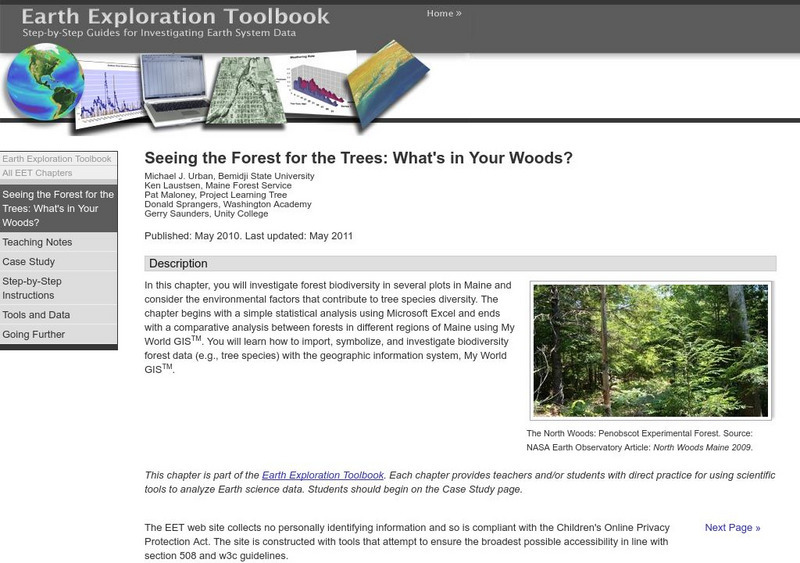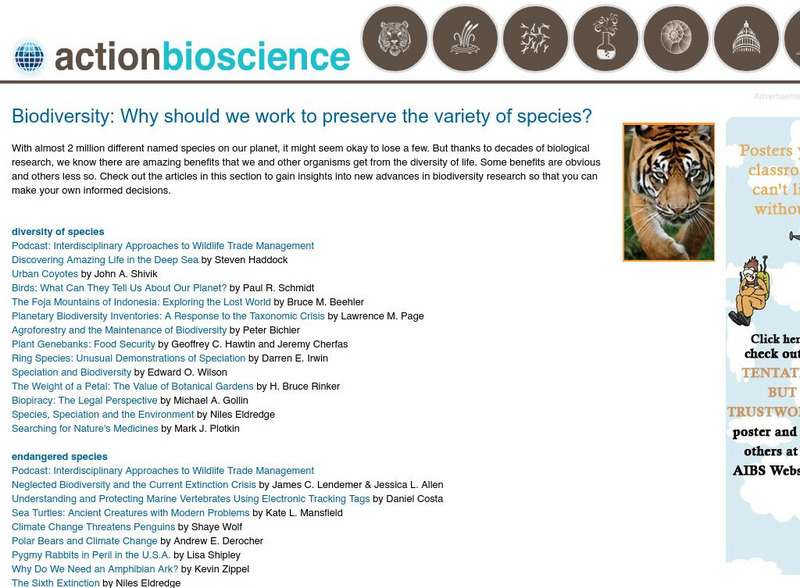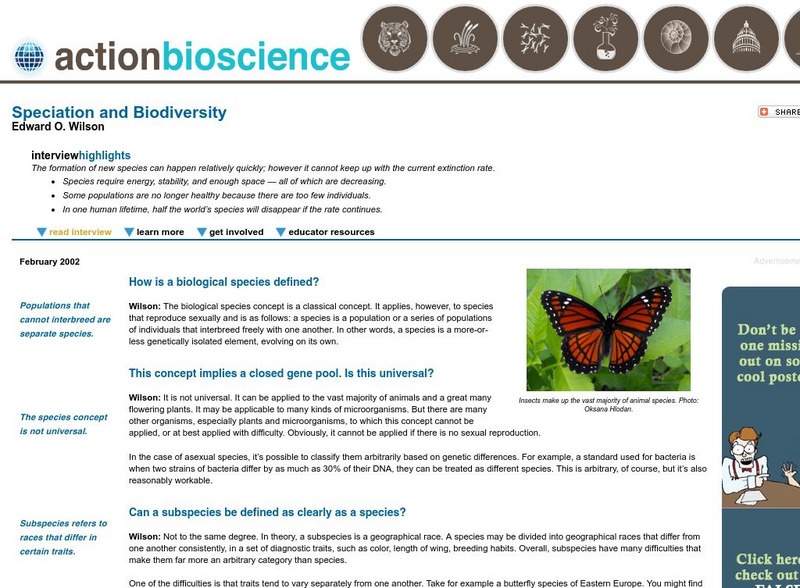Curated OER
Aqualung , the New Age Garden
Students examine how underwater landscape could be used for food production in the future. They discuss underwater landforms, draw a picture of an underwater landscape and a type of technology to use underwater, and write a description...
Curated OER
How Can We Observe Genetic Variation Within a Species?
Students observe intra-species variation by completing standard microbial streaking procedures. They collect data from which they draw observations and complete a worksheet.
Curated OER
Adaptations
Students identify features of animals that enable survival in particular environments and group animals on the basis of their similarities. They compare and contrast features of groups of animals.
Curated OER
Populations
Students calculate the area of grasslands needed to support a small pride of lions. They also identify food web links in an ecosystem and trace the energy pathways in an ecosystem.
Curated OER
Animal clues
Fifth graders use general knowledge to make educated guesses about the habitat and survival strategies of animals from Australia, Antarctica and Africa. They research to confirm and check ideas and group animals in a variety of ways.
Curated OER
Analysing Scientific Explanations for Megafauna Extinction
Students compare explanations for Australian's megafauna extinctions and identify reasons for popular acceptance of certain scientific explanations. They debate and analyze scientific explanations.
Curated OER
Gone Fishing
Students examine the effects of various methods of fishing on fish populations and biodiversity. They read a handout, participate in a simulation of different fishing methods, record the results, and answer discussion questions.
Curated OER
The Gulf of Maine
Students examine their own environments and make connections to larger ecosystems. They watch a video about the gulf of Maine and record the changes that have occurred. They research the gulf and create a food web.
Curated OER
Insect Biodiversity
High schoolers examine biodiversity by conducting comparative biodiversity surveys. They conduct Internet research to identify insects that they have caught in two different habitats, and compare the biodiversity of the two areas.
Curated OER
Biological and Cultural Diversity of a Latin American Country
Students conduct an 8 hour Annual Summit Meeting on the Cultural and Biological Diversity of a Latin American Country. They construct a Rainforest, coffee and banana plantations, and a street scene of a typical large city.
Curated OER
Wildlife Conservation (Senior, Science)
Twelfth graders explore wildlife and the diversity that makes up the living part of the planet Earth. The exploration part of the assignment is done on the Internet using selected web sites.
NASA
Nasa: Imagers: Teacher's Guide
NASA thematic unit targets students in grades 5-8. Within the unit, users will find lesson plans, reproducible worksheets, visuals, and links to useful resources.
NOAA
Noaa: Ocean Diversity Challenge [Pdf]
Read descriptions of organisms that live in the ocean. Locate the organisms on a poster based on their description.
University of California
Ucmp: Life Has a History
This is a very good introduction to the role evolution plays in the development of biodiversity. These topics and extinction are explained with the use of colorful interactive pictures.
Scholastic
Scholastic Explorers: Endangered Ecosystems
A great site with something for all grades. Do research on rainforests, follow field research on animals in Latin America, and show what you know through interactive assessments. Lots to see on this site which is a collaboration of...
University of California
Ucmp: Life Has a History
University of California site showcases how different types of organisms exist on the Earth and the history of life.
American Museum of Natural History
American Museum of Natural History: O Logy: The Tree of Life
Learn about the diversity of species on Earth by exploring a cladogram, a graph-like tree of life that illustrates relatedness among species. Includes instructions for reading cladograms and a pie chart that summarizes the percentages of...
Science Buddies
Science Buddies: Finding Phyla
Animals come in all shapes and sizes, each a small part of the amazing diversity of life. These differences can also help us to classify animals into different groups. Which group do you belong to? Do this experiment to investigate the...
Science Buddies
Science Buddies: Bug Vacuums: Sucking Up Biodiversity
In this science fair project you can take on the role of a wildlife biologist by examining the biodiversity of insects in your own backyard. To do this, you will follow the directions to create a homemade bug vacuum.
Science Education Resource Center at Carleton College
Serc: Investigating Water Quality Through Quantative and Qualitative Analysis
By looking at the bottom dwelling macroinvertebrates, students will investigate water quality and habitat quality in this field lab. Students will record the number of creatures found at the bottom of a pond, lake, ditch, stream or river...
Science Education Resource Center at Carleton College
Serc: Seeing the Forest for the Trees: What's in Your Woods?
In this learning module, students will look at the state of forest biodiversity in Maine, and what conditions lead to greater species diversity of trees. They will use geographic data from different regions of Maine to compare forest...
American Institute of Biological Sciences
Action Bioscience: Biodiversity
This site from the American Institute of Biological Sciences contains articles on a wide array of issues related to species diversity and extinction. Many articles available in Spanish.
American Institute of Biological Sciences
Action Bioscience: Agroforestry and the Maintenance of Biodiversity
Aligned with National Science Education Standards, this article details the goals and processes of agroforestry. Agroforestry is a system of growing trees among areas populated by crops or livestock in an effort to maintain and encourage...
American Institute of Biological Sciences
Action Bioscience: Speciation and Biodiversity
Dr. E.O. Wilson, known internationally as the dean of biodiversity, answers several probing questions about speciation and biodiversity.



